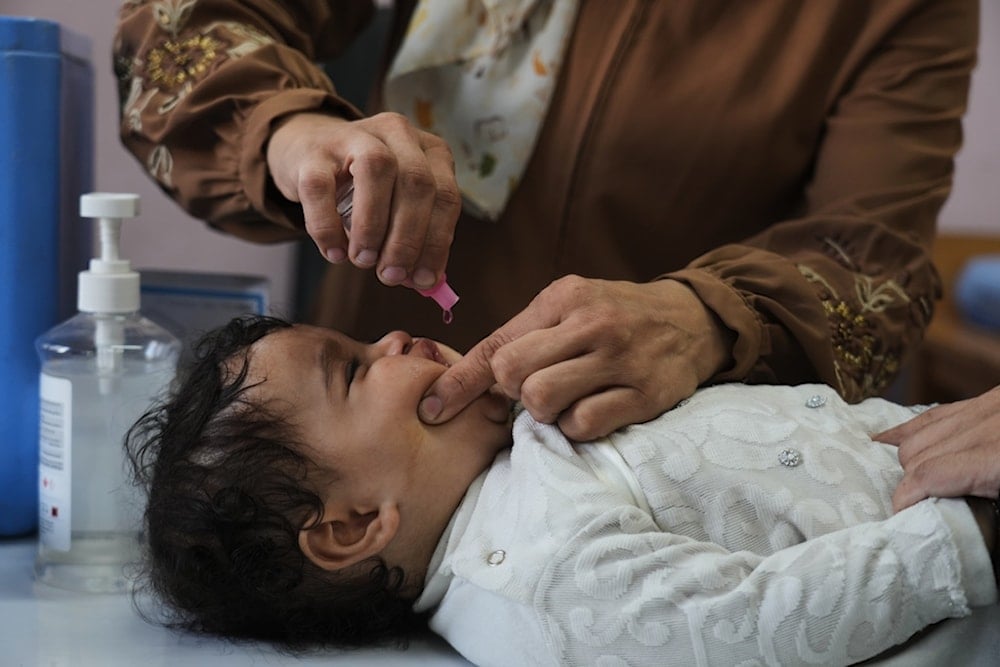UNICEF says vital child vaccines blocked from entering Gaza
UNICEF says syringes, infant formula, and vaccine refrigerators are being blocked from entering Gaza, threatening a child immunisation campaign amid a fragile ceasefire.
-

Palestinian children under age 3 receive vaccinations provided by UNICEF and Palestinian Red Crescent at a health center in Gaza City, Sunday, November 9, 2025 (AP)
UNICEF has warned that essential supplies needed for a mass vaccination campaign in Gaza are being denied entry by the Israeli occupation, hindering efforts to reach children in the war-ravaged territory. The organization said items, including syringes used for routine immunisations and bottles for baby formula, remain held at checkpoints, despite an ongoing ceasefire and growing humanitarian needs.
UNICEF stated that it is currently conducting a catch-up vaccination campaign for children under three, many of whom missed routine immunisations over the past two years of conflict. However, it faces severe difficulty securing access to 1.6 million syringes and solar-powered refrigerators required to safely store vaccine doses, with the supplies awaiting customs clearance since August.
“Both the syringes and the ... refrigerators are considered dual-use by Israel, and these items we're finding very hard to get through clearances and inspections, yet they are urgent,” UNICEF spokesperson Ricardo Pires said.
Aid agencies struggle to deliver supplies under ceasefire
The term “dual-use” refers to items that the Israeli occupation classifies as having potential military as well as civilian applications.
COGAT, the Israeli military body responsible for regulating aid into Gaza, did not comment on the current delays. It has previously said it is not restricting the entry of food, water, medical supplies, or shelter materials, and has accused Hamas of diverting humanitarian aid—an allegation the Palestinian movement denies.
The first round of UNICEF’s vaccination drive began on Sunday, aiming to reach more than 40,000 children who have gone without protection against diseases such as polio, measles, and pneumonia. On its first day, the campaign reached approximately 2,400 children with multiple vaccines.
Critical items remain blocked as malnutrition rises
UNICEF said several key items continue to be prevented from entering Gaza, including 938,000 bottles of ready-to-use infant formula, along with spare parts required to operate water trucks. “That's nearly one million bottles that could be reaching children who have been suffering from different levels of malnutrition,” Pires noted.
The ceasefire that took effect on October 10 was expected to allow a significant increase in aid entering Gaza, where more than two million residents have endured widespread destruction, displacement, and severe shortages of food, clean water, and medical supplies. Relief organizations say that while some aid has been permitted entry, the volume remains far below the level required to meet urgent needs.
UNICEF and other humanitarian agencies continue to call for unfettered access, warning that further delays risk a preventable surge in disease outbreaks among children already weakened by months of hunger and instability.
Children at risk amid declining health coverage
The World Health Organization (WHO) said
one in five children under the age of three in Gaza has either missed some or all of their vaccination doses, leaving them at increased risk of measles, mumps, polio, and other infectious diseases.
The campaign will provide routine childhood vaccines against:
- Measles, mumps, and rubella
- Diphtheria, tetanus, and pertussis
- Hepatitis B and tuberculosis
- Polio, rotavirus, and pneumonia
Rebuilding Gaza’s healthcare infrastructure
UNICEF has supplied 11 types of vaccines, syringes, and storage equipment for the campaign. Around 450 health workers have been trained, while efforts are underway to rebuild damaged health centers.
Before the conflict, Gaza operated 54 immunization facilities and had a vaccination coverage rate of 98%, among the highest globally. Today, 31 of those facilities are no longer operational due to destruction from indiscriminate attacks, and coverage has dropped to below 70%, WHO reported.
UNICEF is currently restoring 15 healthcare centers, while WHO is repairing or rebuilding 20 medical facilities that were either partially or fully destroyed.

 4 Min Read
4 Min Read








